中考英语非谓语动词总结
中考重点非谓语动词的用法
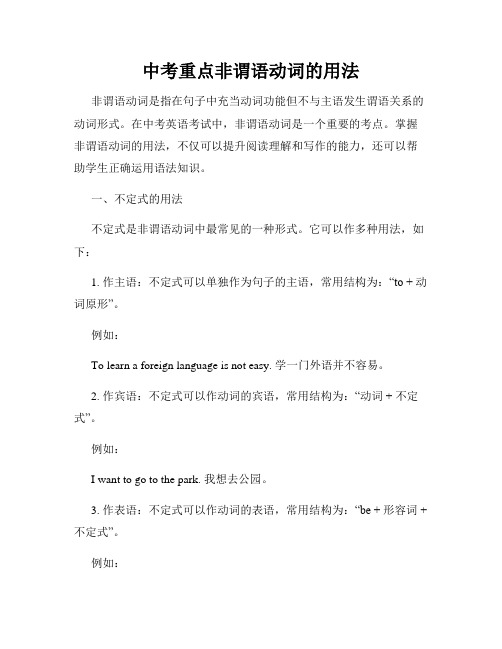
中考重点非谓语动词的用法非谓语动词是指在句子中充当动词功能但不与主语发生谓语关系的动词形式。
在中考英语考试中,非谓语动词是一个重要的考点。
掌握非谓语动词的用法,不仅可以提升阅读理解和写作的能力,还可以帮助学生正确运用语法知识。
一、不定式的用法不定式是非谓语动词中最常见的一种形式。
它可以作多种用法,如下:1. 作主语:不定式可以单独作为句子的主语,常用结构为:“to + 动词原形”。
例如:To learn a foreign language is not easy. 学一门外语并不容易。
2. 作宾语:不定式可以作动词的宾语,常用结构为:“动词 + 不定式”。
例如:I want to go to the park. 我想去公园。
3. 作表语:不定式可以作动词的表语,常用结构为:“be + 形容词 + 不定式”。
例如:My dream is to become a doctor. 我的梦想是成为一名医生。
4. 作定语:不定式可以修饰名词或代词,常用结构为:“名词/代词+ 不定式”。
例如:I need a pen to write a letter. 我需要一支笔来写信。
5. 作状语:不定式可以表示目的、结果、原因等,常用结构为:“为了/以便/以确保/以防止/以免 + 动词原形”。
例如:He went to the library to borrow some books. 他去图书馆借书。
二、现在分词的用法现在分词是以-ing结尾的动词形式,它可以表示主动, 进行或被动的意义,常用于以下情况:1. 作定语:现在分词可以修饰名词或代词,常用结构为:“名词/代词 + 现在分词”。
例如:The running dog is very fast. 跑步的狗跑得很快。
2. 作状语:现在分词可以表示时间、原因、条件等,常用结构为:“现在分词 + 其他成分”或“由现在分词构成短语”。
例如:Feeling tired, she decided to take a nap. 感到疲倦,她决定小睡一会儿。
初中中考常见非谓语动词最全总结

初中英语非谓语动词总结(中考常考)1. 动词:*以下记住每一个词组的第一个动词。
|\fin ish doi ng sth.完成做某事;enjoy doing sth.喜欢做某事;practice doing sth.练习做某事;imagine doing,想象做某事;avoid doing sth避免做某事;consider doing sth 考虑做某事;suggest doing sth建议做某事;\ / mi nd doing sth.介意做某事;keep doing sth持续做某事, miss doing 错过做, advise doing 建议做;keep sb doing让某人一直做2. 固定短语:feel like doi ng sth.喜欢做某事;be busy doing sth忙于做某事;be worth doi ng值得做某事;spe nd time (in) doi ng sth花费时间(金钱)做某事;have difficult/trouble in doing sth 做某事有困难;\ have fun doing做某事高兴3. 介词后(on, in, of, about, at, with, without, for, from, up, by 等):女口:be good at doing sth; thank you for doing sth.;give up doing sth.;stop sb. from doing sth;do well in doing sth. ;be afraid ofdoing sth.;be in terested in doing sth; be proud of in stead of; befond of;what/how about doi ng sth?做某事怎么样?4. to作介词时,后跟动名词的情况:look forward to doing sth 期望做某事;prefer doing sth. to doing sth与…相比较更喜欢…;pay atte nti on to doing 注意做某事;be/get used to doing sth习惯于做某事;make a con tributi on to doing 为…做贡献5. No+动名词,表示禁令:No smoki ng禁止吸烟No parki ng禁止停车6. go+动名词,意思是去进行某种活动或运动:go shopp ing 去购物;go skating去滑冰;go hiking去远足(旅行)7. do some/the+动名词,指进行某种活动:do some clea ning 搞卫生;do some washing 洗衣服;1. 动词:agree (sb)to do 同意去做;afford to do 买得起;decide to do决定去做某事;hope to do希望去做;wish (sb)to do 希望去做;fail to do做某事失败去;/ plan to do打算去做;prete nd to do假装去做;refuse to do拒绝去做;would like to do 想要去做;want (sb)to do想要去做某事;lear n to do 学做;prefer to do sth.喜欢(爱)做某事;sb. seem to do sth好像做某事;wan t/would like to do sth.想做.............................. ;used to do sth.过去常做某事2句型:⑴动词:\ allow sb. to do sth.允许某人去做某事(区分allow doi ng sth)ask sb. (not) to do sth.叫某人做事某事(叫某人不要去做某事)tell sb. (not) to do sth .叫某人去(不要)做某事follow sb. to do sth.跟随某人去做某事get sb. to do sth.让某人去做某事warn sb. (not)to do sth.警告某人做某事(或不要做某事)encourage sb to de鼓励某人做、expect sb to do期待某人做in vite sb to do邀请某人做、teach sb to do教会某人做advise sb to do建议某人做(区分下advise/suggest doing sth (2)................................................. Be+adj (情感类的形容词)+to do be amazed to do sth.对做某事感至『惊讶be afraid to do sth.害怕做某事beexcited to do sth.对做............. 感到兴奋be frightened to do sth.害怕去做某事be glad / happy to do sth.高兴去做某事be / getready to do sth准备做某事be sorry to do sth.对做某事感到抱歉be surprised to dosth.对做某事感到惊奇(3)动词不定式在句中作定语时一般都要放在所修饰名词或代词的后面。
中考英语非谓语动词总结

4 Find 改为中考英语非谓语动词总结一.接动词不定式 to do/ do sthlike to do sth want to do sthwant sb to do sth ask sb not to do sthtell sb not to do sth watch sb do sthIt's time for sb to do sth help sb to do sthhelp do sth make sb do sthdecide not to do sth find it +adj + to do sth have to do sth try not to do sthtry one's best to do sth It's +adj +forof +sb + to do sthplan to do sth It takes sb +some time + to do sth send sb to do sth invite sb to do sthforget to do sth be able to do sthhave sth to do有事要做将来seem to do sthget sb to do sth 让某人做某事疑问词+ to do sthneed sth to do sth use sth to do sthneed to do sth the best way to do sthbe the first / last one to do sth would like to do sthbe excited /surprised to do sth be useful to do sthbe allowed to do sth allow sb to do sthIt's better to do sth take care not to do sth 不小心做某事see sb do sth why not do sthhave enough time to do sth too… to do sthnot… enough to do sth encourage sb to do sthbe careful to do sth be happy/glad/pleased to do sthbe afraid to do sth It's our duty to do sthused to do sth can't afford to do sth 不能负担得起做……make a decision to do sth agree to do sthwait for sb to do sth prefer to do sthoffer to do sth in order not to do sthbe sure to do sth Could /Would you please not do sthwarn sb to do sth There is no need to do sth.二、接动名词 doing sthlike doing sth enjoy doing sthhave fun doing sth be interested in doing sth Thanks sb for doing sth look at sb doing sthstop sb from doing sth What/How doing sthpractice doing sth watch sb doing sthfind sb doing sth mind one's doing sthcan't stand doing sth think about doing sthspend … indoing sth finish doing sthbe busy doing sth keep doing sth.keep sb from doing sth be good at doing sthhate doing sth see sb doing sthThere be +名词+doing sth make a living by doing sth by doing sth have a difficult time doing sth . be afraid of doing sth be used to doing sthgive up doing sth instead of doing sthbefore/ when /while +doing sth start doing sth continue doing sth be used for doing sth =be used to do sthprefer doing sth to doing sth without doing sthcan't stop/help doing sth look forward to doing sth have trouble/problems/difficulty in doing sthbe busy doing sth be worth doing sthIt’s no good / use doing sth.It’s useless doing sth.初中非谓语动词课堂练习题一、选择填空:1—What about going to the net bar this weekend—I’d love to; but my mother often lets me_____ there.A. to goB. not to goC. goD. not go2—Your father is sleeping. You’d better______.A. not to wake him upB. not wake him upC. not wake up himD. not to wake up him3.Tom likes cars. He enjoys_____ model cars of all kinds.A. collectsB. collcetingC. to collectD. collected4. The heavy snowstorm made the mountain climbers_______halfway.A.stopB.to stopC.stoppingD.stopped5. Jim spent three years_____Chinese before he came to China.A.learnedB.to learnC.learningD.learn6. My mother asked me_______in bed.A.not readB.not to readC.not readingD. to read7. Before 2008 we will finish____the Olympic Park.A.buildB.builtC.buildingD.to build8—Bob speaks chinese quite well.—Yes; so he does. He practises______Chinese every day.A. speakingB. speakC. speaksD. spoke9.—Is Wei Fang good at singingYes; she is. We often hear her______in the next room.A.to singB.singsC.singD.sang10. The headmaster told us______ at the Science museum on time.A.arriveB.arrivesC.to arriveD.arriving二、根据句意;用所给动词的适当形式填空:1. Is it necessary ____________learn a foreign language2. He is good at _____________swim.3. Do you have anything ____________say for yourself4. It’s spring now. it’s time _____________plant trees.5.. Let’s __________have a rest; shall we三、改错题:1 In those days we were forced work twelve hours a day.2 It’s very difficult for a foreigner learn Chinese.3 It was silly of you believe what he said.4 He was made wash the boss’s car once a day.5 I’ll let you to know as soon as I hear from her.初中非谓语动词基础题一、选择填空:1.—Father is asleep. Would you mind the TV; Jim—Not at all. I’ll do it right away.A. turning downB. to turn onC. turning upD. turn up2.—Look This sweater is beautiful.—_______A.Why not trying it onB.Why not try on itC.Why not try it onD.Why not trying on it3. We are often told_____at people in trouble.A.not to smileB.to smileC.not to laughD.to laugh4. The box is too heavy for me____it.A.carryingB.carriesC.carryD.to carry5. Look There are many old people______Chinese Kongfu功夫in LongtanPark.A.practiseB.are practisingC.practisingD.practisign6. —Mum; I’m hungry.—What about going t o McDonald’s______ fried chickenA.eatB.to eatC.eatingD.and eat7. I reached Paris yesterday and I had no difficultythe house.A. findingB. to findC. find8. Mr Lee told us an interesting story yesterday. It made all of us .A. laughB. to laughC. laughedD. laughing9. The new term is coming. The students are busy the classrooms.A. cleanB. cleansC. to cleanD. cleaning10. Who do you think you’d like ____A. to make friendsB. make friendsC. to make friends withD. make friends with二、根据句意;用所给动词的适当形式填空:1. The speaker spoke too quickly for us ____________understand.2. The book seems easy __________read.3. Knives are used for ______________cut things.4. I really don’t know what __________do next.5. You’d better _________try this medicine.6. They said they had nothing _________worry about.三、改错题:1 I waved to her but failed attract her attention.2 I have already seen the film twice. I don’t want see it any more.3 What I want know is when all this happened.4 It was clear that he wanted be alone.5 Most children are interested in listen to stories.初中非谓语动词提高题一、选择填空:1.The next morning she found the man ___ in bed;dead.A. lyingB. lieC. layD. laying2. I’m thirsty. Will you get me something ____A. drinkB. to drinkC. eatD. eating3. The chair looks rather hard; but in fact it is very comfortable to ___.A. sitB. sit onC. be seatD. be sat on4.---- I usually go there by train.---- Why not ___ by boat for a changeA. to try goingB. trying to goC. to try and goD. try going5. Paul doesn't have to be made ___. He always works hard.A. learnB. to learnC. learnedD. learning6. Tell him ___ the window.A. to shut notB. not to shutC. to not shutD. not shut7. She pretended ___ me when I passed by.A. not to seeB. not seeingC. to not seeD. having not seen8. Mrs. Smith warned her daughter ___ after drinking.A. never to driveB. to never driverC. never drivingD. never drive9. It was great fun _____ a picnic on the hill.A. to haveB. of havingC. haveD. had10.The patient was warned ___ oily food after the operation.A. to eat noB. eating notC. not to eatD. not eating11.There was a terrible noise ___ the sudden burst of light.A. followedB. followingC. to be followedD. being followed12. When you leave; don’t forget ____ off the light.A. to turnB. turningC. turnD. turned二、根据句意;用所给动词的适当形式填空:1. His wish was ____________become a doctor.2. Stop ___________talk and listen to me carefully.3.. I found a man __________lock the door when I passed by.4. .We couldn’t help _________laugh after we heard the funny story.5. What about ___________go out for a walk6. The boy was too short ___________reach the toy on the desk.三、改错题:1 Walk quickly is difficult for an old man.2 Be careful in cross the street.3 The film is very interesting. It is worth see twice.4 Find work is very difficult these days.5 Most of us students enjoy ask questions in English.参考答案初中非谓语动词课堂练习题一、选择填空:1.C 2.B 3.B 4.A 5.C 6.B 7.C 8.A 9.C10.C二、根据句意;用所给动词的适当形式填空:1.to learn2.swimming3.to say4. to plant5.have三、改错题:1 work 前加 to;此句为 force sb to do sth 的被动形式..2 learn 前加 to;此句用的是it’s difficult for sb to do sth 句型..3 believe 前加 to;此句用的是it’s silly of sb to do sth 句型..4 wash 前加 to;make sb do sth 中的 do 不能带to;但若 make 用于被动语态;则其后的 do 要带 to..5 去掉 to;因为 let 后用作宾语补足语的不定式不能带 to..初中非谓语动词基础题一、选择填空:1.A2.C3.A4.D5.C6.B7.B8.A9.D 10.C二、根据句意;用所给动词的适当形式填空:1.to understand2.to read3.cutting4.to do5.try6.to worry三、改错题:1 attract 前加 to;fail to do sth 意为“未能做某事”..2 see 前加 to;want想要后接动词要用不定式..3 know 前加 to;want想要后接动词要用不定式..4 be 前加 to;want想要后接动词要用不定式..5 listen 改为 listening;介词后接动名词作宾语..初中非谓语动词提高题一、选择填空:1.A2.B3.B4.D5.B6.B7.A8.A9.A 10.C二、根据句意;用所给动词的适当形式填空:1.to become2.talking3.lockingugh5.going6.to reach三、改错题:1 Walk 改为 Walking;用作主语要用动名词;不用动词原形..注意不能将walk 视为名词;因为其后有副词修饰语 quickly..2 cross 改为 crossing;介词后接动名词作宾语..3 see 改为 seeing;worth 后接动词要用动名词形式..Finding;用作主语要用动名词;不用动词原形..5 ask改为asking. enjoy doing sth。
中考英语非谓语动词知识点

中考英语非谓语动词知识点非谓语动词是指在句子中不能独立作谓语,它必须和句子的主语、宾语或者其他成分一起构成谓语,包括不定式、动名词和分词。
以下是中考英语中常见的非谓语动词知识点:1. 不定式(Infinitive)不定式是动词的一种形式,具有名词、形容词和副词的特点。
常见结构:- 常用动词不定式:to + 动词原形(例如:to go)- 动词不定式短语:不定式与其他词(例如:want to go)- 被动形式:to be + 动词的过去分词(例如:to be eaten)常见用法:- 作宾语:I want to go to the cinema.- 作主语:To learn English well is important.- 作表语:The most important thing is to stay positive.- 作宾补:He asked me to help him.2. 动名词(Gerund)动名词是动词的一种形式,以-ing结尾,具有名词和动词的特点。
常见结构:- 一般动名词:动词的-ing形式(例如:eating)- 动名词短语:动名词与其他词(例如:enjoy eating)常见用法:- 作主语:Eating and sleeping are necessary for health.- 作宾语:I like playing basketball.- 作表语:His hobby is swimming.- 作宾补:I saw him playing football.3. 分词(Participle)分词是动词的一种形式,常以-ed或-ing结尾,具有形容词和副词的特点。
常见结构:- 过去分词:动词的-ed形式(例如:played)- 现在分词:动词的-ing形式(例如:playing)常见用法:- 作定语:The book written by him is very interesting.- 作状语:Feeling tired, I went to bed early.- 作补足语:I saw him surrounded by his friends.以上是中考英语中常见的非谓语动词知识点,掌握这些知识点可以帮助理解句子的结构和意思,提高阅读和写作能力。
中考常考的非谓语动词总结,这些考试经常,...
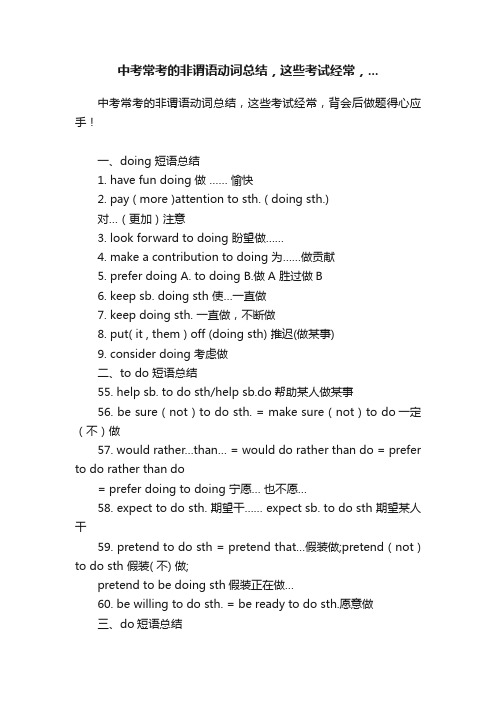
中考常考的非谓语动词总结,这些考试经常,...中考常考的非谓语动词总结,这些考试经常,背会后做题得心应手!一、doing 短语总结1. have fun doing 做…… 愉快2. pay ( more )attention to sth. ( doing sth.)对…(更加)注意3. look forward to doing 盼望做……4. make a contribution to doing 为……做贡献5. prefer doing A. to doing B.做A 胜过做B6. keep sb. doing sth 使…一直做7. keep doing sth. 一直做,不断做8. put( it , them ) off (doing sth) 推迟(做某事)9. consider doing 考虑做二、to do 短语总结55. help sb. to do sth/help sb.do帮助某人做某事56. be sure ( not ) to do sth. = make sure ( not ) to do一定(不)做57. would rather…than… = would do rather than do = prefer to do rather than do= prefer doing to doing 宁愿… 也不愿…58. expect to do sth. 期望干…… expect sb. to do sth 期望某人干59. pretend to do sth = pretend that…假装做;pretend ( not ) to do sth 假装( 不) 做;pretend to be doing sth假装正在做…60. be willing to do sth. = be ready to do sth.愿意做三、do短语总结118. make sb. do sth. 迫使某人做119. let sb. do sth. 让某人做let sb. not do sth. = don’t let sb. do sth.让某人别做某事120. Why not do sth. ? 为什么不做……呢?121. sb. had better ( not ) do sth.最好(不要)做…122. help sb (to) do sth 帮助某人做某事123. can/may /must /should+ do124. be going to + do打算做,将要做四、既可跟doing, 又可跟to 的动词总结131. begin / start doing (to do) sth. 开始做某事132. hate to do / doing sth. 讨厌做某事133. like / love to do ( doing ) 喜欢做某事134. stop to do sth 停下来去做另一件事 stop doing sth. 停止正在做的事135. remember to do sth 记住要做某事remember doing sth 记得做过某事136. forget to do忘了去做……( 该事还未做 forget doing忘了做了……( 该事已经做完 )请关注、转发、点赞、收藏谢谢大家的支持。
九年级非谓语动词知识点

九年级非谓语动词知识点在英语学习中,非谓语动词是一个相对复杂的语法知识点,它由动词原形构成,并且不具有人称和数的变化。
而在句子中,非谓语动词可以作主语、宾语、定语、状语等成分,起到丰富句子结构和表达方式的作用。
本文将从不同的角度论述九年级非谓语动词的知识点,以加深对该知识的理解。
1. 不定式(Infinitive)不定式是非谓语动词中最常见的形式之一。
它可以表示目的、原因、结果、顺序等多种意义,经常在句子中作状语、宾语或定语等。
例如:- He went to the store to buy some groceries.(目的)- I am happy to see you.(原因)- She was too tired to finish the marathon.(结果)不定式的形式为“to + 动词原形”,但在某些情况下可以省略“to”。
例如,当不定式作为动词的宾语时,常常省略“to”。
例如:- She wants (to) go shopping.- I like (to) swim in the river.2. 分词(Participle)分词是非谓语动词中另一个重要的形式。
根据其形式和作用,分词可分为现在分词和过去分词。
现在分词(-ing形式)用来表达主动、进行的动作。
它可以作状语、定语或补语等。
例如:- Walking in the park, he saw his old friend.- The book written by JK Rowling is very popular.过去分词(-ed或-en形式)则用来表达被动、完成的动作。
它常常作定语、补语或状语等。
例如:- The broken window needs to be fixed.- The movie was directed by Steven Spielberg.分词的形式和用法非常灵活,掌握分词的不同形式和用法可以帮助学生更好地理解语言表达习惯。
人教版中考英语非谓语动词总结词
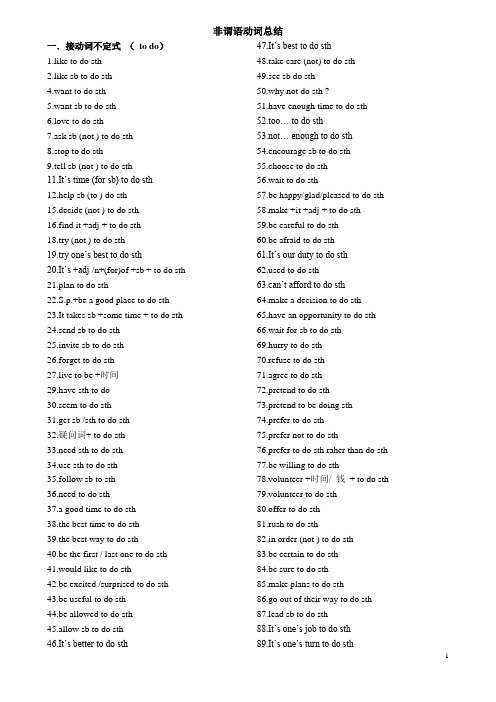
非谓语动词总结一.接动词不定式(to do)1.like to do sth2.like sb to do sth4.want to do sth5.want sb to do sth6.love to do sth7.ask sb (not ) to do sth8.stop to do sth9.tell sb (not ) to do sth11.It’s time (for sb) to do sth12.help sb (to ) do sth15.decide (not ) to do sth16.find it +adj + to do sth18.try (not ) to do sth19.try one’s best to do sth20.It’s +adj /n+(for)of +sb + to do sth21.plan to do sth22.S.p.+be a good place to do sth23.It takes sb +some time + to do sth24.send sb to do sth25.invite sb to do sth26.forget to do sth27.live to be +时间29.have sth to do30.seem to do sth31.get sb /sth to do sth32.疑问词+ to do sth33.need sth to do sthe sth to do sth35.follow sb to sth36.need to do sth37.a good time to do sth38.the best time to do sth39.the best way to do sth40.be the first / last one to do sth41.would like to do sth42.be excited /surprised to do sth43.be useful to do sth44.be allowed to do sth45.allow sb to do sth46.It’s better to do sth 47.It’s best to do sth48.take care (not) to do sth49.see sb do sth50.why not do sth ?51.have enough time to do sth52.too… to do sth53.not… enough to do sth54.encourage sb to do sth55.choose to do sth56.wait to do sth57.be happy/glad/pleased to do sth58.make +it +adj + to do sth59.be careful to do sth60.be afraid to do sth61.It’s our duty to do sthed to do sth63.can’t afford to do sth64.make a decision to do sth65.have an opportunity to do sth66.wait for sb to do sth69.hurry to do sth70.refuse to do sth71.agree to do sth72.pretend to do sth73.pretend to be doing sth74.prefer to do sth75.prefer not to do sth76.prefer to do sth raher than do sth77.be willing to do sth78.volunteer +时间/ 钱+ to do sth79.volunteer to do sth80.offer to do sth81.rush to do sth82.in order (not ) to do sth83.be certain to do sth84.be sure to do sth85.make plans to do sth86.go out of their way to do sth87.lead sb to do sth88.It’s one’s job to do sth89.It’s one’s turn to do sth90.urge sb to do sth92.be supposed to do sth93.warn sb to do sth二、接省略to 不定式(do)1.情态动词+do2.watch sb do sth3.see sb do4.hear sb do5.help do sth6.let sb do7.make sb do sth8.have to do sth9.would do sth rather than do sth10.would rather do sth than do sth11.Could /Would you please (not) do sth ?12.why not do?13.why don’t you do?14.be able to do sth三、接动名词(doing sth )1.like doing sth2.enjoy doing sth3.have fun doing sth4.be interested in doing sth5.Thanks for doing sth7.stop sb doing sth8.stop sb from doing sth9.go + v-ing10.do the (some )+v-ing11.What/How doing sth ?12.practice doing sth13.watch sb doing sth14.find sb doing sth15.mind (one’s ) doing sth16.can’t stand doing sth17.think about doing sth18.spend … (in)doing sth19.finish doing sth20.be busy doing sth21.keep doing sth22.keep sb from doing sth 23.keep sb doing sth24.be good at doing sth25.hate doing sth26.There be +名词+doing sth27.make a living by doing sth28.have a difficult time doing sth29.feel like doing sth30.allow doing sth31.see sb doing sth32.by doing sth33.end up doing sth34.do a survey about doing sth35.be afraid of doing sth36.be used to doing sth37.be terrified of doing sth38.give up doing sth39.instead of doing sth40.have nothing against doing sth41.be serious about doing sth42.have a chance of doing sth43.before/ when /while +doing sth44.start doing sth45.have a lot of experience doing sth46.prefer doing sth47.consider doing sth48.dream of / about doing sth49.continue doing sth50.put off doing sth51.be used for doing sth =be used to do sth52.prefer doing sth to doing sth53.without doing sth54.be comfortable doing sth55.can’t stop/help doing sth56.look forward to doing sth57.be against doing sth58.have trouble/problems/difficulty (in) doing sth59.suggest doing sth60.be busy doing sth61.be worth doing sth。
(完整版)非谓语动词归纳总结
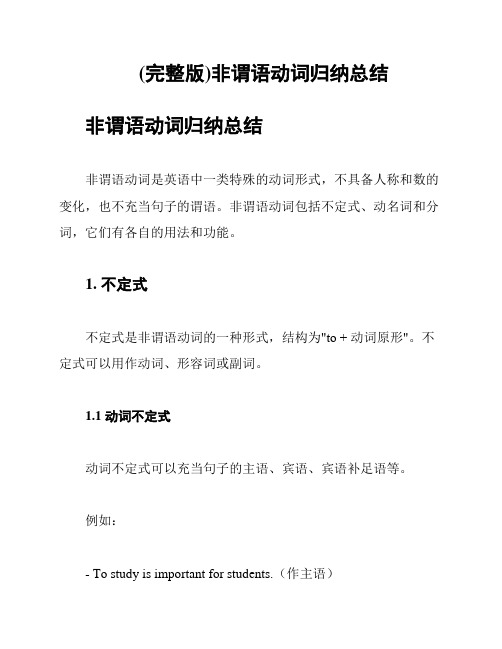
(完整版)非谓语动词归纳总结非谓语动词归纳总结非谓语动词是英语中一类特殊的动词形式,不具备人称和数的变化,也不充当句子的谓语。
非谓语动词包括不定式、动名词和分词,它们有各自的用法和功能。
1. 不定式不定式是非谓语动词的一种形式,结构为"to + 动词原形"。
不定式可以用作动词、形容词或副词。
1.1 动词不定式动词不定式可以充当句子的主语、宾语、宾语补足语等。
例如:- To study is important for students.(作主语)- I want to learn English.(作宾语)- She asked me to help her.(作宾语补足语)1.2 形容词不定式形容词不定式用于修饰名词或代词。
例如:- I have a book to read.(修饰名词)- He is the man to trust.(修饰代词)1.3 副词不定式副词不定式用于修饰动词、形容词或副词。
例如:- She worked hard to pass the exam.(修饰动词)- He is happy to see you.(修饰形容词)- She walked quickly to catch the bus.(修饰副词)2. 动名词动名词是非谓语动词的一种形式,结构为动词的现在分词形式。
动名词可以充当句子的主语、宾语、宾语补足语等。
例如:- Swimming is good exercise.(作主语)- I enjoy playing basketball.(作宾语)- She kept on talking.(作宾语补足语)3. 分词分词是非谓语动词的一种形式,根据时态和完成程度的不同,分词分为现在分词和过去分词。
3.1 现在分词现在分词用于表示主动或进行的动作。
例如:- The running boy is my brother.(作定语)- She stood there, crying.(作状语)3.2 过去分词过去分词用于表示被动或完成的动作。
初中英语知识点归纳非谓语动词的分类与用法

初中英语知识点归纳非谓语动词的分类与用法初中英语知识点归纳:非谓语动词的分类与用法非谓语动词是指不能作谓语的动词形式,包括动词不定式(infinitive)、动名词(gerund)和现在分词(present participle)等形式。
在英语语法中,非谓语动词作为名词、形容词或副词的补语,经常出现在句子中起到修饰或补充说明的作用。
下面将对非谓语动词的分类和用法进行归纳总结。
一、动词不定式(infinitive)1. 主动形式的动词不定式作主语、宾语、表语等。
示例:- To swim in the sea is my favorite activity.(在海里游泳是我最喜欢的活动。
)- I want to be a doctor.(我想成为一名医生。
)2. 不定式的被动形式常常用于被动语态、感官动词和某些特定的动词后作宾语。
示例:- The book is easy to understand.(这本书很容易理解。
)- I heard him singing in the shower.(我听见他在淋浴时唱歌。
)3. 不定式的完成形式表示在谓语动词之前发生的动作。
示例:- I'm happy to have finished my homework.(我很高兴已经完成了作业。
)二、动名词(gerund)1. 动名词作主语,常用于表示习惯、通用事实、抽象概念等。
示例:- Swimming is good for your health.(游泳对健康有益。
)2. 动名词作宾语,常与动词一起构成一些固定搭配。
示例:- I enjoy playing basketball with my friends.(我喜欢和朋友们打篮球。
)3. 动名词作介词的宾语,常用于介词后。
示例:- He is good at singing.(他擅长唱歌。
)三、现在分词(present participle)1. 现在分词作定语,修饰名词或代词。
中考英语语法之非谓语动词
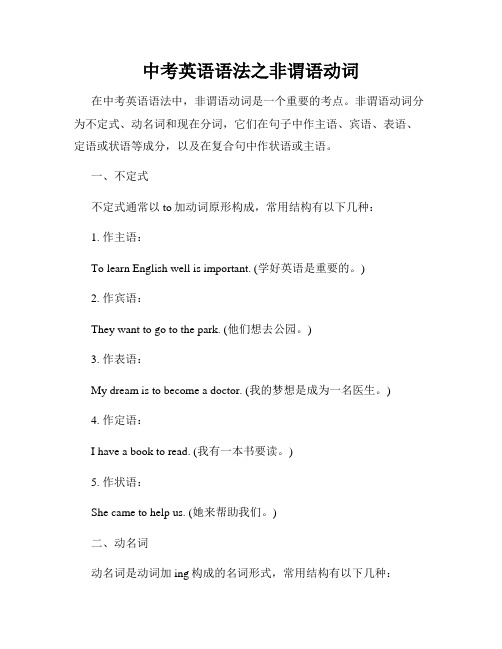
中考英语语法之非谓语动词在中考英语语法中,非谓语动词是一个重要的考点。
非谓语动词分为不定式、动名词和现在分词,它们在句子中作主语、宾语、表语、定语或状语等成分,以及在复合句中作状语或主语。
一、不定式不定式通常以to加动词原形构成,常用结构有以下几种:1. 作主语:To learn English well is important. (学好英语是重要的。
)2. 作宾语:They want to go to the park. (他们想去公园。
)3. 作表语:My dream is to become a doctor. (我的梦想是成为一名医生。
)4. 作定语:I have a book to read. (我有一本书要读。
)5. 作状语:She came to help us. (她来帮助我们。
)二、动名词动名词是动词加ing构成的名词形式,常用结构有以下几种:1. 作主语:Swimming is good for health. (游泳对健康有益。
)2. 作宾语:I enjoy playing basketball. (我喜欢打篮球。
)3. 作表语:His job is teaching. (他的工作是教书。
)4. 作定语:I saw a girl singing in the park. (我看到一个在公园唱歌的女孩。
)5. 作状语:She left the room, crying. (她哭着离开了房间。
)三、现在分词现在分词通常以ing结尾,常用结构有以下几种:1. 作主语:Swimming is my favorite sport. (游泳是我最喜欢的运动。
)2. 作宾语:He enjoys playing the piano. (他喜欢弹钢琴。
)3. 作表语:The movie is interesting. (这部电影很有趣。
)4. 作定语:I saw a girl dancing in the street. (我看到一个在街上跳舞的女孩。
非谓语动词知识点总结

非谓语动词知识点总结非谓语动词是指在句子中不作谓语的动词形式,包括不定式、动名词和分词。
它们具有多种用法和功能,下面将对非谓语动词的知识点进行总结。
一、不定式1. 不定式的形式:以to+动词原形构成,如to eat、to go等。
2. 不定式作主语:To learn English is important.3. 不定式作宾语:I want to eat an apple.4. 不定式作表语:My dream is to become a doctor.5. 不定式作定语:I have a book to read.6. 不定式作状语:She woke up early to catch the train.二、动名词1. 动名词的形式:动词+ing形式,如eating、going等。
2. 动名词作主语:Swimming is good for health.3. 动名词作宾语:I enjoy playing basketball.4. 动名词作表语:His hobby is fishing.5. 动名词作定语:I have a writing task to finish.6. 动名词作状语:He left without saying goodbye.三、分词1. 分词的形式:分为现在分词和过去分词两种形式,如working、played等。
2. 现在分词作主语:Reading helps improve vocabulary.3. 现在分词作宾语:She heard someone calling her name.4. 现在分词作表语:He is a hardworking student.5. 现在分词作定语:I saw a running dog in the park.6. 现在分词作状语:He left the room, closing the door behind him.7. 过去分词作宾语补足语:I found the door closed.四、非谓语动词的逻辑主语1. 不定式的逻辑主语:It is important to learn English.2. 动名词的逻辑主语:Swimming helps improve health.3. 分词的逻辑主语:Reading books is beneficial for children.五、非谓语动词的否定形式1. 不定式的否定形式:not+不定式,如not to go、not to eat等。
中考英语非谓语动词知识点总结
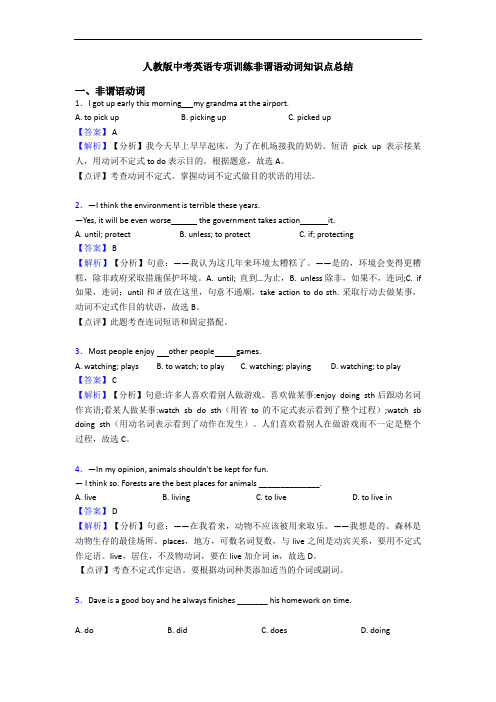
人教版中考英语专项训练非谓语动词知识点总结一、非谓语动词1.I got up early this morning my grandma at the airport.A. to pick upB. picking upC. picked up【答案】 A【解析】【分析】我今天早上早早起床,为了在机场接我的奶奶。
短语pick up表示接某人,用动词不定式to do表示目的。
根据题意,故选A。
【点评】考查动词不定式。
掌握动词不定式做目的状语的用法。
2.—I think the environment is terrible these years.—Yes, it will be even worse the government takes action it.A. until; protectB. unless; to protectC. if; protecting【答案】 B【解析】【分析】句意:——我认为这几年来环境太糟糕了。
——是的,环境会变得更糟糕,除非政府采取措施保护环境。
A. until; 直到…为止,B. unless除非,如果不,连词;C. if 如果,连词;until和if放在这里,句意不通顺,take action to do sth. 采取行动去做某事,动词不定式作目的状语,故选B。
【点评】此题考查连词短语和固定搭配。
3.Most people enjoy other people games.A. watching; playsB. to watch; to playC. watching; playingD. watching; to play【答案】 C【解析】【分析】句意:许多人喜欢看别人做游戏。
喜欢做某事:enjoy doing sth后跟动名词作宾语;看某人做某事:watch sb do sth(用省to的不定式表示看到了整个过程);watch sb doing sth(用动名词表示看到了动作在发生)。
中考英语非谓语知识点归纳总结

中考英语非谓语知识点归纳总结非谓语动词是英语语法中的重要部分,也是中考考试中的常见考点。
精通非谓语动词的用法对于提高语言综合运用能力至关重要。
本文将从不定式、动名词和此刻分词三个方面总结中考英语非谓语知识点,援助同砚们更好地理解和使用非谓语动词。
一、不定式(Infinitive)不定式是非谓语动词的一种形式,一般由to加动词原形构成。
不定式可以用作动词、名词或形容词。
以下是不定式的几种常见用法:1.作宾语:常见动词如hope, want, plan等后面接不定式作宾语,表示期望、欲望、规划等:- I hope to visit my grandparents next summer.- She wants to become a doctor in the future.2.作主语:不定式可以作为句子的主语,常见于以下句型中:- It + be + adj. + to do sth.- To learn English well is my goal.3.作定语:不定式可以修饰名词或代词,常见于以下句型中:- a + adj. + 不定式- She has a book to read.4.作状语:不定式可以作状语,表示目标、结果、原因等:- He studied hard to pass the exam.- He ran so fast as to catch the bus.二、动名词(Gerund)动名词是非谓语动词的一种形式,一般由动词原形加ing构成。
动名词可以作主语、宾语、表语、定语和状语。
以下是动名词的几种常见用法:1.作主语:动名词可以作为句子的主语,常见于以下句型中:- Playing basketball is my favorite hobby.- Swimming is good for health.2.作宾语:常见动词如enjoy, dislike, suggest等后面接动名词作宾语: - I enjoy reading novels in my free time.- She suggested going to the movies together.3.作表语:动名词可以作表语,常见于以下句型中:- My hobby is playing the piano.- Her dream is becoming a famous singer.4.作定语:动名词可以修饰名词,常见于以下句型中:- a + adj. + 动名词- He is fond of playing soccer.三、此刻分词(Participle)此刻分词是非谓语动词的一种形式,一般由动词原形加ing构成。
初中非谓语动词知识点总结
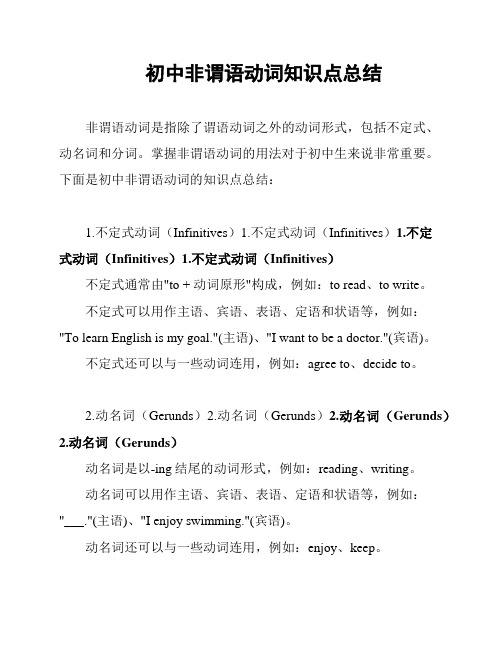
初中非谓语动词知识点总结非谓语动词是指除了谓语动词之外的动词形式,包括不定式、动名词和分词。
掌握非谓语动词的用法对于初中生来说非常重要。
下面是初中非谓语动词的知识点总结:1.不定式动词(Infinitives)1.不定式动词(Infinitives)1.不定式动词(Infinitives)1.不定式动词(Infinitives)不定式通常由"to + 动词原形"构成,例如:to read、to write。
不定式可以用作主语、宾语、表语、定语和状语等,例如:"To learn English is my goal."(主语)、"I want to be a doctor."(宾语)。
不定式还可以与一些动词连用,例如:agree to、decide to。
2.动名词(Gerunds)2.动名词(Gerunds)2.动名词(Gerunds)2.动名词(Gerunds)动名词是以-ing结尾的动词形式,例如:reading、writing。
动名词可以用作主语、宾语、表语、定语和状语等,例如:"___."(主语)、"I enjoy swimming."(宾语)。
动名词还可以与一些动词连用,例如:enjoy、keep。
3.分词(Participles)3.分词(Participles)3.分词(Participles)3.分词(Participles)分词有现在分词和过去分词两种形式。
现在分词以-ing结尾,过去分词通常以-ed或其他形式结尾,例如:running、broken。
现在分词可以表示主动或进行的动作,过去分词可以表示被动或完成的动作,例如:"The dog barking is ___."(主动)、"The window ___."(被动)。
分词可以用作定语和状语等,例如:___"(定语)、"Feeling tired。
最全的非谓语动词知识点总结
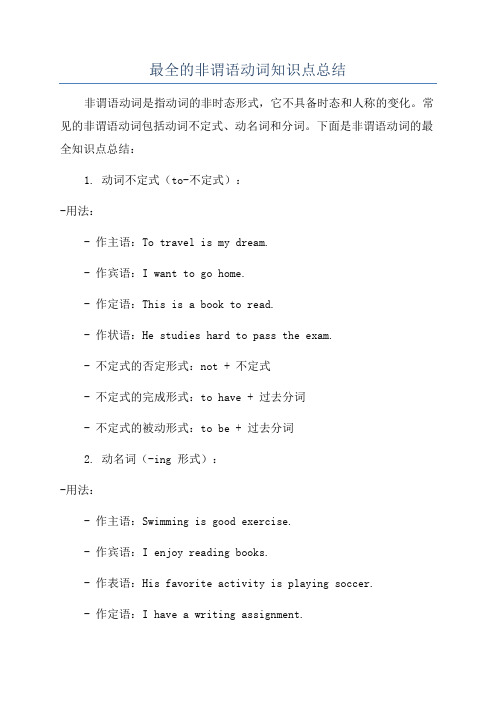
最全的非谓语动词知识点总结非谓语动词是指动词的非时态形式,它不具备时态和人称的变化。
常见的非谓语动词包括动词不定式、动名词和分词。
下面是非谓语动词的最全知识点总结:1. 动词不定式(to-不定式):-用法:- 作主语:To travel is my dream.- 作宾语:I want to go home.- 作定语:This is a book to read.- 作状语:He studies hard to pass the exam.- 不定式的否定形式:not + 不定式- 不定式的完成形式:to have + 过去分词- 不定式的被动形式:to be + 过去分词2. 动名词(-ing 形式):-用法:- 作主语:Swimming is good exercise.- 作宾语:I enjoy reading books.- 作表语:His favorite activity is playing soccer.- 作定语:I have a writing assignment.- 作状语:She left, crying.- 动名词的否定形式:not + 动名词-动名词可以表示一些动作、状态或者习惯性的行为3.分词:- 现在分词(-ing 形式):-用法:- 作定语:The running water is cold.- 作状语:He left, whistling a tune.-合并式现在分词:在主语和系动词之间发生合并,形成一个合并式的形容词。
- The girl is crying. (合并式:The girl is crying.)- 过去分词(一般以 -ed 或 -en 结尾):-用法:- 作定语:A broken window needs to be fixed.- 作状语:I was tired, so I went to bed.-分词作定语时,与被修饰词之间具有被动、完成、被完成等被动意义。
(详细版)非谓语动词总结报告

(详细版)非谓语动词总结报告非谓语动词总结报告非谓语动词是指在句子中起到动词的作用,但并不担当句子的谓语成分。
本报告将总结非谓语动词的种类及其用法,以帮助读者更好地理解和运用非谓语动词。
一、非谓语动词的种类1. 不定式(Infinitive):不定式通常以“to”开头,常见的形式有不定式一般式和不定式完成式,如:to study, to have studied。
2. 动名词(Gerund):动名词是将动词变为名词形式,通常以“-ing”结尾,如:studying, having studied。
3. 现在分词(Present Participle):现在分词通常以“-ing”结尾,如:studying。
4. 过去分词(Past Participle):过去分词通常是不规则变化,如:studied。
二、非谓语动词的用法1. 不定式的用法:- 作为动词宾语,如:I want to study.- 用于形容词后,如:I am happy to help.- 用于副词后,如:He came back to visit us.2. 动名词的用法:- 作为主语,如:Studying is important.- 用于介词后,如:She is good at cooking.3. 现在分词的用法:- 作为形容词,修饰名词,如:The running water is clear. - 作为副词,修饰动词,如:He fell asleep while studying.4. 过去分词的用法:- 用于被动语态,如:The book was written by him.- 用于完成时态,如:I have finished the work.三、注意事项在使用非谓语动词时,需要注意以下几个方面:- 根据具体语境选择使用不定式、动名词等。
- 注意非谓语动词和主语、宾语、介词、形容词等的搭配关系。
- 避免使用过多的非谓语动词造成句子结构复杂不清。
初中非谓语动词最全总结
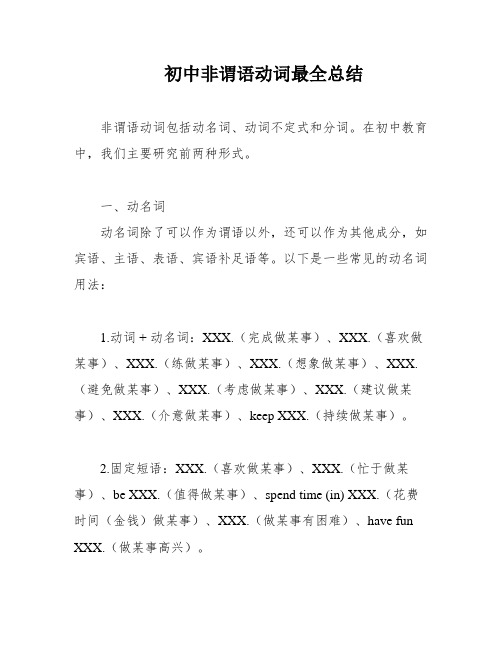
初中非谓语动词最全总结非谓语动词包括动名词、动词不定式和分词。
在初中教育中,我们主要研究前两种形式。
一、动名词动名词除了可以作为谓语以外,还可以作为其他成分,如宾语、主语、表语、宾语补足语等。
以下是一些常见的动名词用法:1.动词 + 动名词:XXX.(完成做某事)、XXX.(喜欢做某事)、XXX.(练做某事)、XXX.(想象做某事)、XXX.(避免做某事)、XXX.(考虑做某事)、XXX.(建议做某事)、XXX.(介意做某事)、keep XXX.(持续做某事)。
2.固定短语:XXX.(喜欢做某事)、XXX.(忙于做某事)、be XXX.(值得做某事)、spend time (in) XXX.(花费时间(金钱)做某事)、XXX.(做某事有困难)、have fun XXX.(做某事高兴)。
3.介词后(on。
in。
of。
about。
at。
with。
without。
for。
from。
up。
by等):be good at doing sth.(擅长做某事)、thank you for doing sth.(感谢做某事)、give up XXX.(放弃做某事)、XXX.(阻止某人做某事)、do well in doing sth.(做某事做得好)、XXX.(害怕做某事)、be XXX.(对做某事感兴趣)、be proud of(以…为自豪)、instead of(代替)、be fond of(喜爱)。
4.to作介词:look forward to doing sth.(期望做某事)、XXX.(与…相比较更喜欢…)、pay n to doing sth.(注意做某事)、be/get used to doing sth.(惯于做某事)、XXX(为…做贡献)。
二、动词不定式动词不定式通常作为动词的宾语、宾语补足语、主语、表语、定语等。
以下是一些常见的动词不定式用法:1.动词 + 不定式:decide to do sth.(决定做某事)、want to do sth.(想做某事)、XXX.(希望做某事)、try to do sth.(尝试做某事)、fail to do sth.(未能做某事)、XXX.(拒绝做某事)、promise to do sth.(承诺做某事)、manage to do sth.(设法做某事)。
完整word版中考英语非谓语动词知识点汇总,文档

中考英语非谓语动词知识点汇总一、动词不定式1.动词不定式作宾语。
在动词want,hope,wouldlike,decide,wish,choose,try,need等后常用动词不定式作宾语。
Ihope______(hear)fromyousoon.2)think/find/feel/makeit+adj+todosthHefounditdifficult_______(get)tosleep.3).stoptodosth/stopdoingsthstoptodosth 停下来去做某事stopdoingsth 停止正在做的事。
Afterworkingforalongtime,Hehastostop_______(have)arest.Hewasverytired,sohehadtostop______(work).2.动词不定式作宾语补。
1).带to的不定式作宾补的动词有:ask/like/wouldlike/teach/tell/want/help+sb+todosthPleaseaskhim_________(come)quickly.2).省掉to的不定式作宾补的动词有:let /make /hear /see /notice /have/watch+sb+dosth注:省掉 to的不定式的句子变被动语态时,需要复原to.Hemadethebaby_______(stop)crying.Thebabywasmade___________crying.3.动词不定式作主语1).动词不定式常可用作句子的主语时,谓语动词用单数形式。
2).常用it作形式主语,而将不定式放在句子后面。
Todosth+ 谓语动词+adj/n=It+谓语动词+adj/n+todosthTogetaninjectionisalittlepainful._____alittlepainful________aninjection4.动词不定式作定语动词不定式作定语放在被修饰词之后名词或代词+todo( 介词)注:假设构成的不定式的动词为不及物动词时,其后加上相应的介词。
- 1、下载文档前请自行甄别文档内容的完整性,平台不提供额外的编辑、内容补充、找答案等附加服务。
- 2、"仅部分预览"的文档,不可在线预览部分如存在完整性等问题,可反馈申请退款(可完整预览的文档不适用该条件!)。
- 3、如文档侵犯您的权益,请联系客服反馈,我们会尽快为您处理(人工客服工作时间:9:00-18:30)。
中考英语非谓语动词总结改为(4) Find一.接动词不定式(to do/ do sth )like to do sth want to do sthask sb (not ) to do sth want sb to do sthwatch sb do sth tell sb (not ) to do sthhelp sb (to ) do sth It's time (for sb) to do sthmake sb do sth help do sthfind it +adj + to do sth decide (not ) to do sthtry (not ) to do sth have to do sthIt's +adj +(for)of +sb + to do sth try one's best to do sthIt takes sb +some time + to do sth plan to do sthinvite sb to do sth send sb to do sthbe able to do sth forget to do sthseem to do sth 将来) 有事要做have sth to do(让某人做某事疑问词+ to do sth get sb to do sthuse sth to do sth need sth to do sththe best way to do sth need to do sthwould like to do sth be the first / last one to do sthbe useful to do sth be excited /surprised to do sthallow sb to do sth be allowed to do sthtake care (not) to do sth It's better to do sth (不)小心做某事why not do sth ? see sb do sthtoo…to do sth have enough time to do sthencourage sb to do sth not…enough to do sthbe happy/glad/pleased to do sth be careful to do sthIt's our duty to do sth be afraid to do sth……(不能)负担得起做can't afford to do sth used to do sthagree to do sth make a decision to do sthprefer to do sth wait for sb to do sthin order (not ) to do sth offer to do sthCould /Would you please (not) do sth ? be sure to do sthwarn sb to do sth There is no need to do sth.二、接动名词(doing sth )like doing sth enjoy doing sthbe interested in doing sth have fun doing sthlook at sb doing sth Thanks sb for doing sthWhat/How doing sth ? stop sb from doing sthwatch sb doing sth practice doing sthmind (one's ) doing sth find sb doing sththink about doing sth can't stand doing sthfinish doing sth spend …(in)doing sthkeep doing sth be busy doing sthbe good at doing sth .keep sb from doing sthsee sb doing sth hate doing sthmake a living by doing sth There be +名词+doing sthhave a difficult time doing sth . by doing sthbe used to doing sth be afraid of doing sthinstead of doing sth give up doing sthstart doing sth before/ when /while +doing sthbe used for doing sth =be used to do sth continue doing sthwithout doing sth prefer doing sth to doing sthlook forward to doing sth can't stop/help doing sthhave trouble/problems/difficulty (in) doing sthbe worth doing sthbe busy doing sthIt's no good / use doing sth. It's useless doing sth.初中非谓语动词课堂练习题一、选择填空:( )1—What about going to the net bar this weekend?—I'd love to, but my mother often lets me_____ there.A. to goB. not to goC. goD. not go( )2—Your father is sleeping. You'd better______.A. not to wake him upB. not wake him upC. not wake up himD. not to wake up him( )3.Tom likes cars. He enjoys_____ model cars of all kinds.A. collectsB. collcetingC. to collectD. collected( )4. The heavy snowstorm made the mountain climbers_______halfway.A.stopB.to stopC.stoppingD.stopped( )5. Jim spent three years_____Chinese before he came to China.A.learnedB.to learnC.learningD.learn( )6. My mother asked me_______in bed.A.not readB.not to readC.not readingD. to read( )7. Before 2008 we will finish____the Olympic Park.A.buildB.builtC.buildingD.to build( )8—Bob speaks chinese quite well.—Yes, so he does. He practises______Chinese every day.A. speakingB. speakC. speaksD. spoke( )9.—Is Wei Fang good at singing?Yes, she is. We often hear her______in the next room.A.to singB.singsC.singD.sang( )10. The headmaster told us______ at the Science museum on time.A.arriveB.arrivesC.to arriveD.arriving二、根据句意,用所给动词的适当形式填空:1. Is it necessary ____________(learn) a foreign language?2. He is good at _____________(swim).3. Do you have anything ____________(say) for yourself?4. It's spring now. it's time _____________(plant) trees.5.. Let's __________(have) a rest, shall we?三、改错题:(1) In those days we were forced work twelve hours a day.(2) It's very difficult for a foreigner learn Chinese.(3) It was silly of you believe what he said.(4) He was made wash the boss's car once a day.(5) I'll let you to know as soon as I hear from her.初中非谓语动词基础题一、选择填空:the TV, Jim? —Father is asleep. Would you mind ( )1.—Not at all. I'll do it right away.D. turn up C. turning up A. turning down B. to turn on( )2.—Look! This sweater is beautiful.—_______?A.Why not trying it onB.Why not try on itC.Why not try it onD.Why not trying on it( )3. We are often told_____at people in trouble.A.not to smileB.to smileC.not to laughD.to laugh( )4. The box is too heavy for me____it.A.carryingB.carriesC.carryD.to carry( )5. Look! There are many old people______Chinese Kongfu(功夫)in LongtanPark.A.practiseB.are practisingC.practisingD.practisign( )6. —Mum, I'm hungry.—What about going to McDonald's______ fried chicken?A.eatB.to eatC.eatingD.and eat( )7. I reached Paris yesterday and I had no difficulty the house.A. findingB. to findC. find( )8. Mr Lee told us an interesting story yesterday. It made all of us .A. laughB. to laughC. laughedD. laughing( )9. The new term is coming. The students are busy the classrooms.A. cleanB. cleansC. to cleanD. cleaning( )10. Who do you think you'd like ____?A. to make friendsB. make friendsC. to make friends withD. make friends with二、根据句意,用所给动词的适当形式填空:1. The speaker spoke too quickly for us ____________(understand).2. The book seems easy __________(read).3. Knives are used for ______________(cut) things.4. I really don't know what __________(do) next.5. You'd better _________(try) this medicine.6. They said they had nothing _________(worry) about.三、改错题:(1) I waved to her but failed attract her attention.(2) I have already seen the film twice. I don't want see it any more.(3) What I want know is when all this happened.(4) It was clear that he wanted be alone.(5) Most children are interested in listen to stories.初中非谓语动词提高题.一、选择填空:( )1.The next morning she found the man ___ in bed,dead.A. lyingB. lieC. layD. laying( )2. I'm thirsty. Will you get me something ____?A. drinkB. to drinkC. eatD. eating( )3. The chair looks rather hard, but in fact it is very comfortable to ___.A. sitB. sit onC. be seatD. be sat on( )4.---- I usually go there by train.---- Why not ___ by boat for a change?A. to try goingB.trying to goC.to try and goD.try going ( )5. Paul doesn't have to be made ___. He always works hard.A. learnB. to learnC. learnedD. learning( )6. Tell him ___ the window.A. to shut notB. not to shutC. to not shutD. not shut( )7. She pretended ___ me when I passed by.A.not to seeB. not seeingC. to not seeD.having not seen ( )8. Mrs. Smith warned her daughter ___ after drinking.A. never to driveB. to never driverC. never drivingD. never drive ( )9. It was great fun _____ a picnic on the hill.A. to haveB. of havingC. haveD. had( )10.The patient was warned ___ oily food after the operation.A. to eat noB. eating notC. not to eatD. not eating( )11.There was a terrible noise ___ the sudden burst of light.A. followedB. followingC. to be followedD. being followed ( )12. When you leave, don't forget ____ off the light.A. to turnB. turningC. turnD. turned二、根据句意,用所给动词的适当形式填空:1. His wish was ____________(become) a doctor.2. Stop ___________(talk) and listen to me carefully.3.. I found a man __________(lock) the door when I passed by.4. .We couldn't help _________(laugh) after we heard the funny story.5. What about ___________(go) out for a walk?6. The boy was too short ___________(reach) the toy on the desk.三、改错题:(1) Walk quickly is difficult for an old man.(2) Be careful in cross the street.(3) The film is very interesting. It is worth see twice.(4) Find work is very difficult these days.(5) Most of us students enjoy ask questions in English.【参考答案】.初中非谓语动词课堂练习题一、选择填空:1.C 2.B 3.B 4.A 5.C 6.B 7.C 8.A 9.C 10.C二、根据句意,用所给动词的适当形式填空:1.to learn2.swimming3.to say4. to plant5.have三、改错题:(1) work 前加to,此句为force sb to do sth 的被动形式。
